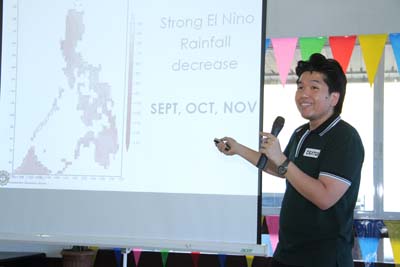by James Edgar T Sia

Quoting environmental superhero Captain Planet, Engr Dexter Lo, director of the Xavier University Engineering Resource Center (XU ERC), told religious leaders and others present at an interfaith forum that the power is theirs to do whatever they could to drastically reduce, if not completely prevent, the casualties and property damage that may result from future weather disasters.
Local religious leaders from various faiths – indigenous, Evangelical, Muslim, Buddhist, and Catholic – as well as participants from other sectors attended the 3rd Interfaith Dialogue on Climate Change held on May 29 at the Cagayan de Oro City Tourism Hall, where Engr Lo delivered a presentation on the impacts of climate change in the Cagayan de Oro River Basin. Archbishop Antonio J Ledesma SJ represented the Catholic Church of Cagayan de Oro.
Engr Lo began his presentation with temperature maps of the Philippines through the years since 1884, demonstrating that temperatures have been climbing steadily, and at an alarming rate since recent decades. Data from colleague Dr Gemma Narisma, program head of the Regional Climate Systems of the Manila Observatory, revealed that average temperatures are rising, which he dubbed “the new normal.” Furthermore, he added, higher temperatures mean more water evaporating into the atmosphere, which would eventually lead to heavier rains. Lo also presented findings from the International Rice Research Institute, whose research showed that rice crops yield 10% less harvest for every degree Celsius above the norm.
Lo reminded participants that in spite of predictions backed by hard evidence made years before Sendong, people still settled in flood-prone areas in the Cagayan de Oro River Basin. Lo called the phenomenon “a perfect recipe for disaster just waiting to happen.” He concluded by stating that while average global temperatures may continue to climb at an alarming rate in subsequent decades, consequently, “the probability that we may get hit [by another weather disaster] is bigger, but the decision is ours [to prepare for such contingencies].”